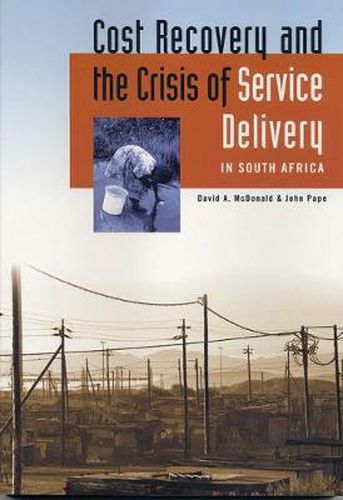Readings Newsletter
Become a Readings Member to make your shopping experience even easier.
Sign in or sign up for free!
You’re not far away from qualifying for FREE standard shipping within Australia
You’ve qualified for FREE standard shipping within Australia
The cart is loading…






This is the first book in South Africa - and internationally - to bring together a theoretical and empirical review of the impact of cost recovery on basic municipal services such as water and electricity. There has been a dramatic shift worldwide from welfare municipalism to a neoliberal vision of balanced budgets and fiscal restraint. Cost recovery is at the heart of this new municipal vision with far reaching implications for access to services, affordability and privatization.
The book describes the theory and practice of cost recovery and lays out the conceptual framework for six case studies. The book offers two distinct sets of alternative possibilities. The first are reformist in nature, arguing for more equity-oriented models of cost recovery. The second are more radical and explore ways of reversing the insidious effects of commodification, the role of the market in shaping the moral and economic fabric of service delivery, and the way we value essential goods such as water.
This book will be of interest both theoretically and empirically to anyone interested in local governance, service delivery, public goods and social movements.
$9.00 standard shipping within Australia
FREE standard shipping within Australia for orders over $100.00
Express & International shipping calculated at checkout
This is the first book in South Africa - and internationally - to bring together a theoretical and empirical review of the impact of cost recovery on basic municipal services such as water and electricity. There has been a dramatic shift worldwide from welfare municipalism to a neoliberal vision of balanced budgets and fiscal restraint. Cost recovery is at the heart of this new municipal vision with far reaching implications for access to services, affordability and privatization.
The book describes the theory and practice of cost recovery and lays out the conceptual framework for six case studies. The book offers two distinct sets of alternative possibilities. The first are reformist in nature, arguing for more equity-oriented models of cost recovery. The second are more radical and explore ways of reversing the insidious effects of commodification, the role of the market in shaping the moral and economic fabric of service delivery, and the way we value essential goods such as water.
This book will be of interest both theoretically and empirically to anyone interested in local governance, service delivery, public goods and social movements.